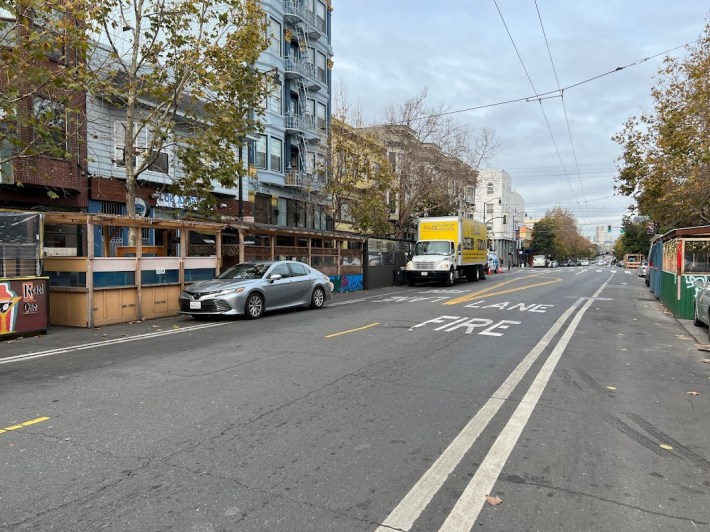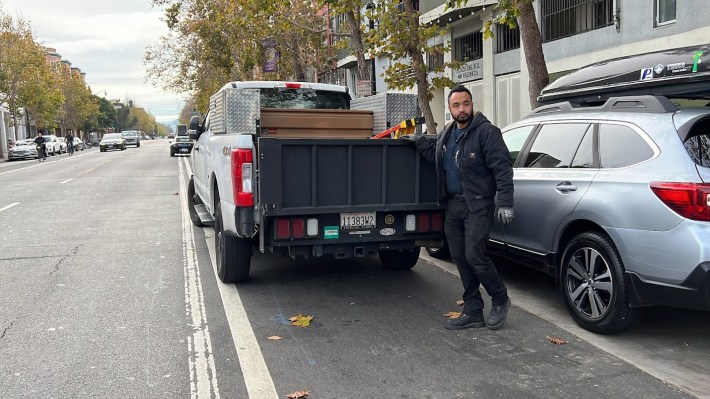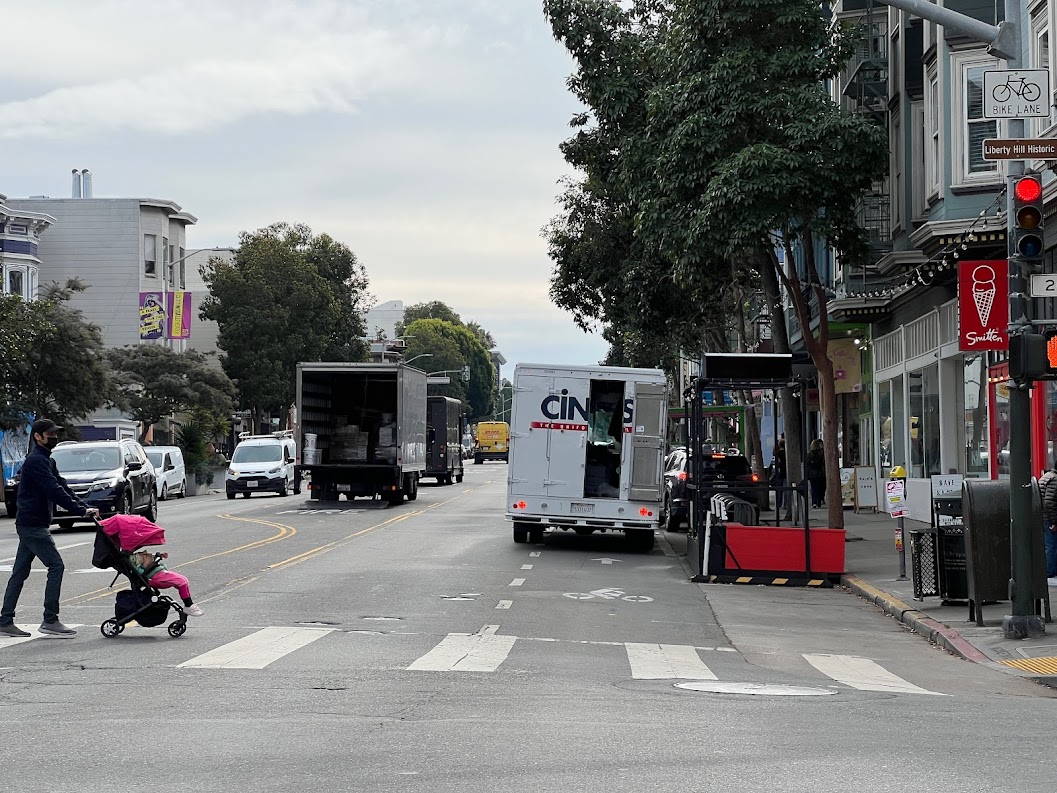Note: GJEL Accident Attorneys regularly sponsors coverage on Streetsblog San Francisco and Streetsblog California. Unless noted in the story, GJEL Accident Attorneys is not consulted for the content or editorial direction of the sponsored content.
Imagine how motorists would react if Valencia's traffic lanes, instead of its bike lanes, were continually blocked by Ubers, Lyfts, and delivery trucks. They're going to get an idea what that would be like next year, during a planned protest to push the city to build that street's long-promised protected bike lanes. "There will be a group of three to four standing in the car lane of Valencia, parallel to a double-parked car. We will be there 'Just a Minute,'" explained People Protected Bike Lane organizer Maureen Persico, mimicking the excuse made by motorists who park in bike lanes. "When that car leaves, our group will return to the sidewalk. Repeating as necessary."
Streetsblog readers will recall that in 2017 Valencia received a pilot protected bike lane on the short stretch from Cesar Chavez to Mission, with the aim of eventually expanding protection along the entire street to stop the scourge of motorists blocking the street's existing, paint-only bike lanes. Then in 2019, after regular protests and lobbying from bike advocates, a second pilot was built, from Market to 15th. In both cases, SFMTA failed to protect the intersections, and instead used the dreaded "mixing zone" treatments, where cyclists are expected to jockey for position with turning cars and trucks. Meanwhile, the bike lanes on the majority of Valencia, from 15th to Chavez, were left completely unprotected.
Since then, cyclists continue to be injured.
In February of 2020, SFMTA presented a new design to protect cyclists along the length of Valencia, using Dutch-style protected intersections. Then the COVID-19 pandemic hit, and planning work was put on hold. More parklets and shared spaces were introduced, offering new possibilities for Valencia. Many advocates wanted to see the street become car-free or car light, with through-traffic banned, even before the pandemic made that a part-time reality.
But presently that's not happening, at least during the week. And protected bike lanes with safe intersections still only exist on paper.
"The weekend closures help a lot. In terms of long-term change, I think this time of year people are busy with other things, and yes the other Slow Streets/street closures to vehicles have taken up a lot of the advocacy energy," wrote advocate Bruce Halperin in an email to Streetsblog.
Halperin is referring to new, post-COVID efforts such as the Great Walkway/Great Highway fight and car-free JFK, which are rightfully taking up advocacy hours. However, it's obvious that without continued pressure the city won't build the promised safety improvements on Valencia.
"MTA paused the planning and outreach work on this to let the Shared Spaces discussion solidify. I believe they plan to begin re-engaging in the new year, when we hopefully will have a clearer picture of what Shared Spaces locations will be staying vs being scaled back under the regulations of the permanent program that was approved this summer and is being phased in beginning January 1," wrote Jacob Bintliff, Legislative Aide to Supervisor Rafael Mandelman, who represents a good portion of Valencia.

"The design massively changed with parklets," wrote People Protected Bike Lane advocate Matt Brezina in an email to Streetsblog. But "we need to see leadership from [Supervisors] Ronen and Mandelman on protecting vulnerable road users, achieving city VMT [reduction and] mode share goals, and making sure kids can safely walk and bike to school."
Streetsblog has reached out to SFMTA and will update this post. But according to their web page, the agency is in a wait-and-see mode. "The number of Shared Spaces change from week to week, and until the permanent program helps to stabilize the number of parklet installations, loading zones and other uses on Valencia, it is challenging to make an informed recommendation for a protected bikeway design on the corridor."
But advocates see that as an excuse for more delay. "It’s clear they could make room for both wide sidewalks and protected cycle paths if they limited the auto portion," said Livable City's Tom Radulovich. They should "give up on keeping Valencia a high-capacity auto throughway."
In Streetsblog's view, there's nothing stopping SFMTA from installing parking-protected bike lanes, perhaps done with cheap materials, San Jose-style, while further reconfigurations of the street are decided. It's just not acceptable to leave things as they are, year after year, while people get hurt. "I actually moved to the Valencia corridor just this month and I can confirm that it’s the same clusterfuck as always," wrote Halperin.

"It is still a huge priority to us to see protected bike lanes along the entire Valencia corridor," wrote the San Francisco Bicycle Coalition's Nesrine Majzoub in an email to Streetsblog.
"We obviously need to push them again," said Brezina about SFMTA and the relevant politicians. "That's why advocates are planning the 'Just a Minute' protest."
"Our intention is not to shame the double-parked car drivers," wrote Persico. "Our intention is to stop traffic so the bicyclists passing are safe and to point out the need for infrastructure on Valencia, like we were PROMISED."






